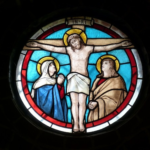We run our website the way we wished the whole internet worked: we provide high quality original content with no ads. We are funded solely by your direct support. Please consider supporting this project.

The Risk of Love
The most basic and yet most profound teaching of the Bible is that “God is love” (1 Jn 4:8; 16). He is revealed to be a God who is triune—Father, Son and Holy Spirit (See Mt 3:16; 28:19, Jn 14:26; 15:26)—who’s very essence is an eternal, loving relationship. He created the world out of love and for the purpose of expanding his love.
God the Father desires that we dwell in Christ and Christ dwell in us, just as Christ dwells in the Father and he in Christ (John 17:21-26). The Father wants us to participate in and reflect the loving union that he has with Christ. The goal, in other words, is for the perfect triune love of God to be manifested to people, replicated in people and reflected back from people. This is why God created the world. The whole of creation is meant to express and embody the eternal triune love that God is. It exists to glorify God.
Humans are to glorify God by expressing his love and authority as we rule the earth. God wants to be Lord over all creation, but because he is the triune God of love, he doesn’t want to do this unilaterally. Of course he could have created a world where we have to do his will, but it would have been a creation devoid of love. Instead, God wants to rule creation through coregents, free agents who through love apply his sovereign will to the earth. God therefore created us “in his image” that we might “have dominion” and “subdue” the earth (Gen 1:26-28).
In such a world, there is risk because love must be chosen. Unless people can choose not to love, they can’t genuinely choose to love. The possibility of the one is built into the possibility of the other. Love simply cannot be coerced or programmed into people.
A creation in which love is the goal must incorporate risk. Creation doesn’t have to have actual evil, but it must allow for the possibility of evil—if the possibility of genuine love is to exist.
This is why God commanded humans to have dominion over the world in the creation story. If we weren’t free to disobey God, a command would be unnecessary; we would do what God created us to do automatically. Because God wants his will carried out in love, he empowers humans to carry out his command freely. And this, of course, means we can refuse to carry out his command if we choose.
God gave Adam and Eve free will in the Garden. The purpose of this freedom was that they might choose to remain in loving union with God. But because it was a union of love, it had to be possible for Adam and Eve to reject it. Tragically, the first couple chose to disobey God, thereby bringing judgment on themselves and their descendants (Gen 3:1-19). This disobedience was not part of God’s original plan; it was a rejection of God’s plan. Yet the possibility of this rejection had to exist if God’s original plan was to be possible. His plan is for people to administrate his creation as they receive, replicate and reflect back God’s triune love.
—Adapted from Is God to Blame?, pages 62-65
Related Reading

God’s Love is Cruciform
Paul instructs us in what it means to follow Jesus, when he stated, “Follow God’s example, therefore, as dearly loved children and walk in the way of love, just as Christ loved us and gave himself up for us as a fragrant offering and sacrifice to God (Eph 5:1-2). Here Paul defines what it means to…

Podcast: Does God ALWAYS Act Out of Love?
Greg talks about the nouns and verbs of God. Dan talks about unicorns named Gary. http://traffic.libsyn.com/askgregboyd/Episode_0411.mp3

Defining Love
If God’s eternal essence is love, as discussed in this post, then we must ask: What does this confession actually mean? We must explore this question carefully because “love” has been defined in many theological streams in ways that seem contradictory to the kind of love revealed by Christ. As with so many other things,…

Participating in the Divine Nature (Love)
When God created the world, it obviously wasn’t to finally have someone to love, for God already had this, within himself. Rather God created the world to express the love he is and invite others in on this love. This purpose is most beautifully expressed in Jesus’ prayer in John 17. Jesus prays to his…

So Much Evil. Why?
In light of the profound evil being experienced by the people of Paris and countless other locations around the world, we thought we would raise again the question that many ask when things like this occur: Why? Of course, Greg has spent much of his writing and speaking energy addressing this. Here is a basic,…

Christians and Creation Care
Image by Ali Inay While the mustard seed of the Kingdom has been planted, it obviously hasn’t yet taken over the entire garden (Matt 13:31-42). We continue to live in an oppressed, corrupted world. We live in the tension between the “already” and the “not yet.” Not only this, but we who are the appointed landlords…
